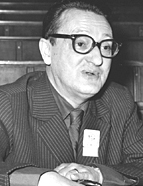

The 1980s marked the culmination of his work (having begun in the 1950s) which saw considerable scientific projection, in addition to an important dissemination component. At both levels, justifying the critical appraisal of W. G. L. Randles: "For future scholars of the Renaissance period, he has raised nautical astronomy from the status of an arcane subject to become an 'incontornável' [unavoidable] core feature of the History of the Discoveries" (W G L Randles, "Luís de Albuquerque and the History of Nautical Science in Portugal", 1998, p. 135).
It was also around this time and as a consequence that Luís de Albuquerque directed several highly impactful collective projects, such as the six-volume work entitled Portugal no Mundo [Portugal in the World], which was accompanied by the edition (with the same graphic design) of a work entitled Os Descobrimentos Portugueses [The Portuguese Discoveries], which was to be his great review of the navigations period. This decade also saw the resuscitation of an old issue, as old as it was erroneous and fanciful: "a torrent of speculation and fantasy", as rightly stated by Luís Filipe Thomaz on the 1986 publication of a book which, displaying an extensive copy of the work of writer and librarian Patrocínio Ribeiro (without ever quoting him), sought to revive the "Portuguese Columbus” myth.
It should be acknowledged that this issue transcends the historiographical dimension of the supposed problem, given the political connotation a specific sector sought to assign to it. However, Luís de Albuquerque stuck, as expected, to that aspect exclusively, and somehow the "controversy" became the pretext that triggered the most direct intervention in one of the most invariable components of his work: criticism of the many fanciful features that contaminate the History of the Discoveries, laden with imaginary glories which were indeed, as someone wrote, imagined. On a strictly scientific level Luís de Albuquerque, following the example of Duarte Leite, was critical of Armando Cortesão, and closer to his brother Jaime's formulations in the different conceptions that clashed with those of the Coimbra professors. The two-volume book Dúvidas e Certezas na História dos Descobrimentos Portugueses [Doubts and Certainties in the History of the Portuguese Discoveries] (2 vols., 1990-91) bears a two-fold dimension: the Doubts (volume I), in criticism of the hypothetical and fanciful issues of the Discoveries; the Certainties of the realities that denote their effective importance for Portuguese and world history.
